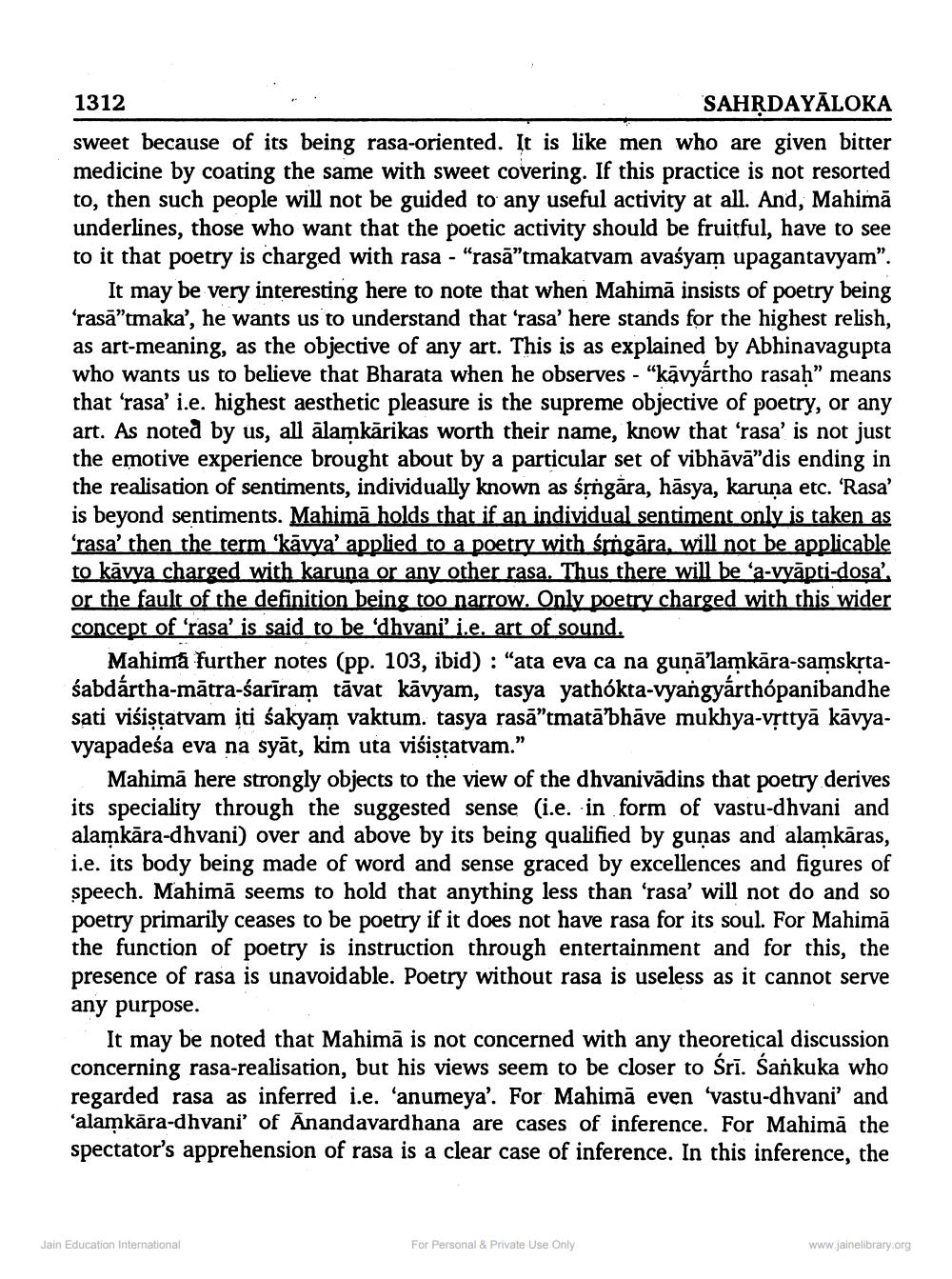________________
1312
SAHRDAYĀLOKA sweet because of its being rasa-oriented. It is like men who are given bitter medicine by coating the same with sweet covering. If this practice is not resorted to, then such people will not be guided to any useful activity at all. And, Mahimā underlines, those who want that the poetic activity should be fruitful, have to see to it that poetry is charged with rasa - "rasā”tmakatvam avaśyam upagantavyam”.
It may be very interesting here to note that when Mahimā insists of poetry being 'rasā"tmaka', he wants us to understand that 'rasa' here stands for the highest relish, as art-meaning, as the objective of any art. This is as explained by Abhinavagupta who wants us to believe that Bharata when he observes - "kavyártho rasaḥ” means that 'rasa' i.e. highest aesthetic pleasure is the supreme objective of poetry, or any art. As noted by us, all ălamkārikas worth their name, know that 'rasa' is not just the emotive experience brought about by a particular set of vibhāvā"dis ending in the realisation of sentiments, individually known as śrăgăra, hāsya, karuna etc. 'Rasa' is beyond sentiments. Mahimā holds that if an individual sentiment only is taken as 'rasa' then the term 'kāvva' applied to a poetry with śrīgāra, will not be applicable to kāvva charged with karuna or any other rasa. Thus there will be 'a-vyāpti-dosa', or the fault of the definition being too narrow. Only poetry charged with this wider concept of 'rasa' is said to be 'dhvani' i.e. art of sound.
Mahima further notes (pp. 103, ibid) : “ata eva ca na guņā’lamkāra-samskstaśabdártha-mātra-śarīram tāvat kāvyam, tasya yathokta-vyangyárthópanibandhe sati visistatvam iti śakyam vaktum. tasya rasā”tmatā'bhāve mukhya-vịttyā kāvyavyapadeśa eva na syāt, kim uta visistatvam.”
Mahima here strongly objects to the view of the dhvanivādins that poetry derives its speciality through the suggested sense (i.e. in form of vastu-dhvani and alamkāra-dhvani) over and above by its being qualified by gunas and alamkāras, i.e. its body being made of word and sense graced by excellences and figures of speech. Mahimā seems to hold that anything less than 'rasa' will not do and so poetry primarily ceases to be poetry if it does not have rasa for its soul. For Mahimā the function of poetry is instruction through entertainment and for this, the presence of rasa is unavoidable. Poetry without rasa is useless as it cannot serve any purpose.
It may be noted that Mahima is not concerned with any theoretical discussion concerning rasa-realisation, but his views seem to be closer to Śrī. Sankuka who regarded rasa as inferred i.e. anumeya'. For Mahimā even vastu-dhvani' and ‘alamkāra-dhvani' of Anandavardhana are cases of inference. For Mahim, the spectator's apprehension of rasa is a clear case of inference. In this inference, the
Jain Education International
For Personal & Private Use Only
www.jainelibrary.org




